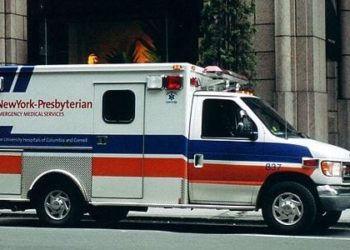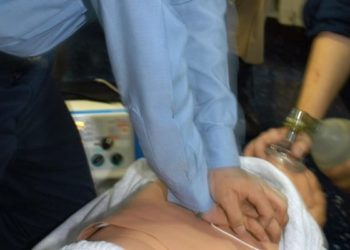A retrospective look at CPR use in surgical patients
Jan 23rd – 1 in 203 surgical patients experience cardiac arrest requiring CPR.
[tabs tab1=”2MM Rundown” tab2= “2MM Full Report” tab3=”About the Authors”]
[tab]
Image: CeCILL/Rama.
1. 1 in 203 surgical patients experience cardiac arrest requiring CPR.
2. The number of comorbidities and complications in surgical patients is associated with CPR rates.
3. Cardiac surgery patients have the highest incidence of CPR perioperatively, however, they also have the highest rate of survival to discharge.
This study helps define the inherent risk for cardiac failure in the surgical patient. The study has a number of strengths, the predominant of which is the large number of subjects studied. The large size of the sample allows the authors to draw associations between uncommon surgical events such as severe sepsis and cardiac arrest that a smaller study would not have been empowered to detect. Furthermore, the subanalyses performed by the authors on various comorbidities and patient characteristics gave the results a broad spectrum of applicability such that practitioners in various fields may utilize these findings to guide management in their specific clinical circumstances.
The major limitation of this study is that it draws upon a study population that was not selected to look specifically at the topic the authors have in question. The ACS-NSQIP is merely a descriptive database of information and although it has well defined measures for numerous variables, these measures were not defined by or controlled for by the authors. Further, the retrospective nature of this study makes it difficult for the authors to draw any hypothesis-driven conclusions or make any cause-and-effect determinations. Even with these limitations, the study is a powerful descriptive tool that will allow for future investigation to be made in the realm of perioperative complications such as cardiac arrest.
Click to read the study in JAMA Surgery
[/tab]
[tab]
Image: CeCILL/Rama.
1. 1 in 203 surgical patients experience cardiac arrest requiring CPR.
2. The number of comorbidities and complications in surgical patients is associated with CPR rates.
3. Cardiac surgery patients have the highest incidence of CPR perioperatively, however, they also have the highest rate of survival to discharge.
This [retrospective cohort] study: Patient data representing a variety of surgical subspecialties was gathered from the American College of Surgeons–National Surgical Quality Improvement Program (ACS-NSQIP). CPR incidence was analyzed alongside various measures, including postoperative complications (e.g. prolonged ventilator use, severe sepsis, etc.), mortality, and survival to discharge. Overall incidence of CPR use in surgical patients was 1 in 203. The greater the number of complications that a patient had, the greater their chance for cardiac arrest, with severe sepsis being one of the strongest predictor. Further, the mortality in patients who received CPR was nearly 42 times greater compared to those who did not. The majority of cardiac arrests occurred postoperatively and carried a mortality rate of 73%. Comparatively, the minority of patients that received CPR intraoperatively experienced a mortality rate of only 61%. When analyzed by surgical specialty, cardiac surgery patients had a much higher incidence of CPR as compared to the remainder of the cohort, but also had a higher survival rate to discharge.
Further reading:
- Cardiopulmonary resuscitation of adults in the hospital: A report of 14720 cardiac arrests from the National Registry of Cardiopulmonary Resuscitation
- Pre-resuscitation factors associated with mortality in 49,130 cases of in-hospital cardiac arrest: A report from the National Registry for Cardiopulmonary Resuscitation
- American College of Surgeons–National Surgical Quality Improvement Program (ACS-NSQIP)
In sum: This study helps define the inherent risk for cardiac failure in the surgical patient. The study has a number of strengths, the predominant of which is the large number of subjects studied. The large size of the sample allows the authors to draw associations between uncommon surgical events such as severe sepsis and cardiac arrest that a smaller study would not have been empowered to detect. Furthermore, the subanalyses performed by the authors on various comorbidities and patient characteristics gave the results a broad spectrum of applicability such that practitioners in various fields may utilize these findings to guide management in their specific clinical circumstances.
The major limitation of this study is that it draws upon a study population that was not selected to look specifically at the topic the authors have in question. The ACS-NSQIP is merely a descriptive database of information and although it has well defined measures for numerous variables, these measures were not defined by or controlled for by the authors. Further, the retrospective nature of this study makes it difficult for the authors to draw any hypothesis-driven conclusions or make any cause-and-effect determinations. Even with these limitations, the study is a powerful descriptive tool that will allow for future investigation to be made in the realm of perioperative complications such as cardiac arrest.
Click to read the study in JAMA Surgery
By [DM] and [MK]
More from this author:
- [Computer modeling improves orbital fracture repair] (Jan 15, 2013)
- [Long-term physical activity is associated with several health markers in the serum metabolome] (January 2, 2013)
- [Combined annuloplasty and chordal cutting decreases chronic mitral regurgitation after posterior myocardial infarction] (Dec 11, 2012)
- [Body mass index is a longitudinal risk factor for hypertension] (Nov 27, 2012)
- [Oxidative stress enhances the effectiveness of hyperthermic chemotherapy for peritoneal metastases] (Nov 15, 2012)
© 2013 2minutemedicine.com. All rights reserved. No works may be reproduced without written consent from 2minutemedicine.com. Disclaimer: We present factual information directly from peer reviewed medical journals. No post should be construed as medical advice and is not intended as such by the authors or by 2minutemedicine.com. PLEASE SEE A HEALTHCARE PROVIDER IN YOUR AREA IF YOU SEEK MEDICAL ADVICE OF ANY SORT. Content is produced in accordance with fair use copyrights solely and strictly for the purpose of teaching, news and criticism. No benefit, monetary or otherwise, is realized by any participants or the owner of this domain.
[/tab]
[tab]
 Devin Miller: Devin is a 3rd year M.D. candidate at Johns Hopkins University.
Devin Miller: Devin is a 3rd year M.D. candidate at Johns Hopkins University.
 Mimmie Kwong: Mimmie is a 3rd year M.D. candidate at Johns Hopkins School of Medicine in Baltimore, MD.
Mimmie Kwong: Mimmie is a 3rd year M.D. candidate at Johns Hopkins School of Medicine in Baltimore, MD.
[/tab]
[/tabs]




